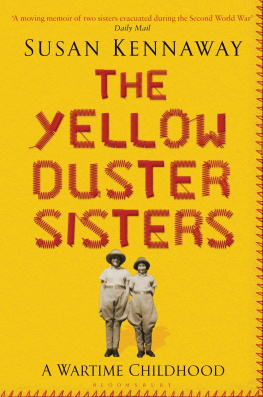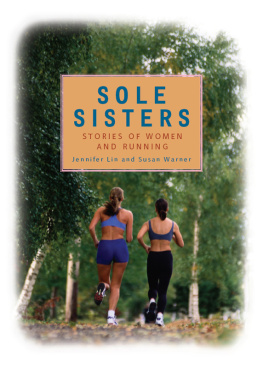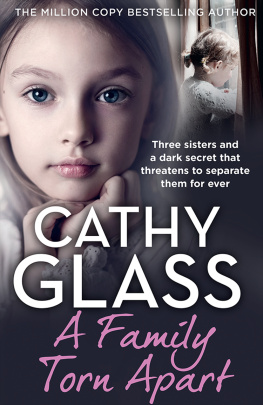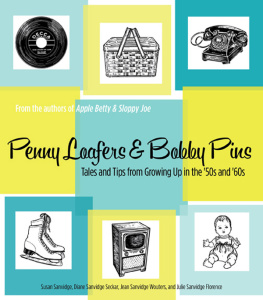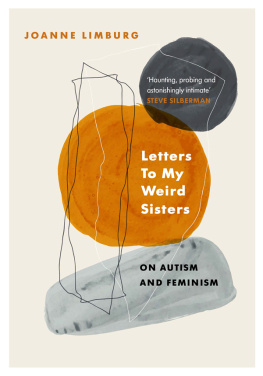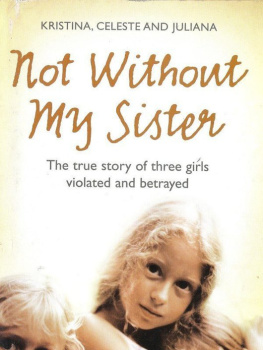SUSAN KENNAWAY was born in Watford in 1930 . At the onset of the Second World War, she and her sister were evacuated to Africa. She was educated at Cheltenham Ladies College and later at the Ruskin School of Art, Oxford. She married the writer James Kennaway, and they had four children before his death in a car accident, aged forty. Susan married Stanley Vereker on her fiftieth birthday and together they moved to the Tarn in France where Susan restores porcelain and they open their garden to the public for charity. Susan and Stanley have fourteen grandchildren and one great granddaughter. Susan Kennaway is the author of The Kennaway Papers ; The Yellow Duster Sisters is her second book.
The Kennaway Papers
I had a sister. Her name was Gyll. She bossed me about a good deal, but as she was twenty-two months older than me she had age and size on her side. While Gyll was bright as a berry, rosy-cheeked and with dark curly hair, I resembled a milky junket. I remember Mummys friends comparing our looks, and while they had many words of praise for Gyll, they pursed their lips unhappily when they gazed on me, sometimes with a curious sadness or despair as if I were not expected to see another summer, not that there was anything otherwise wrong with me. We had a brother, Dick, five years older than me and away at school. He didnt have much time for us girls anyway.
Gyll was very keen on acting. She normally spoke with quite a pronounced stutter, a bit like Mummy, who had learnt to overcome that problem by simply leaving out the difficult letters. She was married to my father, Ertram Eric, as Joan Edith Arbara. He was, in fact, generally called Eric by my mother and his friends, but not evidently by an ardent Mollie Clancy, who wrote him passionate love letters headed My darling Bertrand. These he left, proudly and conveniently in an obvious place on a shelf in the library. You could hardly miss the antique-bound book, inside of which he had left the badly written outpourings of Mollies heart. How awful for Mummy, we thought as we grew up, to have this old love affair thrust under her nose, but Im not sure that she really cared because it made him look a right old fool. Perhaps she even had a bit of a laugh. I hope so.
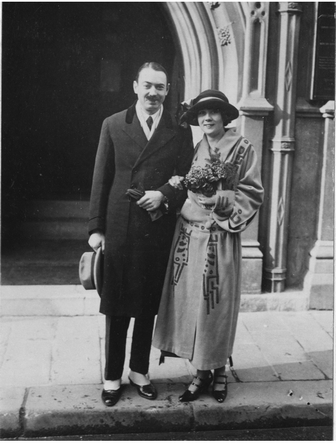
Being a Great Actress, Gyll never stuttered when she trod the boards. She made up plays, the plots of which she had pinched from unsuitable novels, which she plucked from the bookcases and read, hidden, behind the sofa. (I remember one with the unforgettable title of The Knife Behind the Curtain. )
Careless of any sort of plot, she aimed with artistic abandon to include a couple of tragic deathbed scenes or bloody good murders. Mummy paled when she found the secreted books that Gyll had been reading, and confiscated them, but not before her elder daughter had discovered the joy of fiction and, evidently, of drama.
The stage was generally set in the hall that lay between the kitchen quarters and the sitting room. For two or three days before the theatrical event was to take place, Gyll would place, strategically, cardboard notices, complete with arrows, saying This way to the Sow. Mummy and Daddy laughed but I didnt know why.
We had a lot of shows. Gyll always took the lead; I always played the dogs-body. Even when we had the Grand Pageant at school, in a wet field on a cold day, Gyll had been chosen to play King Alfred the Great, with fine stirring lines, while I was given the part of Boadicea, my armour made of silver-paper all squashed as we sheltered from the rain under a not-quite-large-enough oak tree, while I repeated and repeated to myself my only lines, Though I am but a woman, I too have done my duty. When the moment came, I said butter woman, and Gyll giggled.
Now I sat beside her, clutching my big doll Joan, called after Mummy, the best person I knew. My doll had a moonish face and a very unfortunate hole in the top of her head where my older brother Dick had driven a knitting needle through the top of her poor large hairless skull. It was not his only beastly attempt to kill her. He had, on several occasions, hanged her from a branch of a silver-birch tree in the quiet corner of the garden, the noose pulled tightly round her fat neck, the knotting fixed to a branch too high for me to be able to reach and rescue her.
In that same bosky patch, under the cool earth where I used to watch Mummy planting crocus bulbs (only to be followed by the squirrels who immediately dug them up and presumably ate them), also lay my beautiful wooden sewing box. It had been a very special present from my godmother. This casket, lined so divinely with brilliant orange satin, with little compartments for thimble and thread, buttons, hooks and eyes and reels of cotton, had been commandeered by my brother on one never-to-be-forgotten morning for the burial of a dead starling that the cat had been found throwing about in the air, as if willing it, through an imitation of flight, back to life to be tortured yet once again. Such a purpose-built coffin was not likely to be overlooked, even though I tearfully suggested that a shortbread tin would serve the purpose equally well. My brother won the day then, as he always did.
Boys, it seemed to me, had a pretty good time all around. Only a couple of years previously Gyll and I had been ousted from home to spend Christmas at the Bushey Park Hotel with our governess, because Dick was in quarantine for infantile paralysis, polio to you. Mummy and Daddy also quarantined themselves, since they did not visit us even on Christmas Day. Gyll and I worried a little about that we had always thought infantile paralysis was something that only affected children. Were they really in mortal danger or were we? We never knew.
At the outbreak of the war in September 1939 , I had been packed off to join Gyll at her boarding school, Gardenhurst, at Burnham-on-Sea in Somerset. Gyll had been dispatched a term before to live by the sea. Gyll suffered from chronic catarrh, and cold, salty sea air was thought to be a good remedy. Well, it was either a choice of sea air or being hanged upside down by her feet, a novel theory suggested by the family doctor, to cure her ailment (which in the end turned out to be an allergy to dog hair. Goodbye Sally, the cocker spaniel, when this was discovered). Mummy, however, did not much like the idea of hanging Gyll, so banishment it was. Now I was to join her. I was quite looking forward to it.
We were not driven down to Burnham-on-Sea by East. In fact, my uncle Stuart, Daddys brother, drove us and a more bizarre choice of driver could hardly have been made by our parents, who, for one reason or another, did not accompany us. Maybe Uncle Stuart had plenty of petrol, which was already in short supply; maybe he was going to visit his son who lived in Somerset. He intimidated me, because he was big and so unlike Daddy, but he treated Gyll and me as if we were adults and, some years later, charmingly took the time and trouble to explain abstract art to me. He was an inspired artist (a Royal Academician), an enthusiastic cricketer, playing for his county, and, above all, a very serious drinker.
On the way down to Burnham-on-Sea I remember feeling rather queasy after he had encouraged me to drink a second beer, which I was too scared to refuse, while pausing at one of the pubs on the way. Gyll was wobbling about a bit too. By the time we arrived at the school, I felt distinctly ill. I kept the information to myself as I did not want Gyll, or any of the other girls, to brand me as homesick, which I thought was a shaming sign of weakness. No one had explained to me that homesickness was an emotional, not a physical, response to being away from home. I dreaded that the other girls should think that I was being a sissy.
Next page
